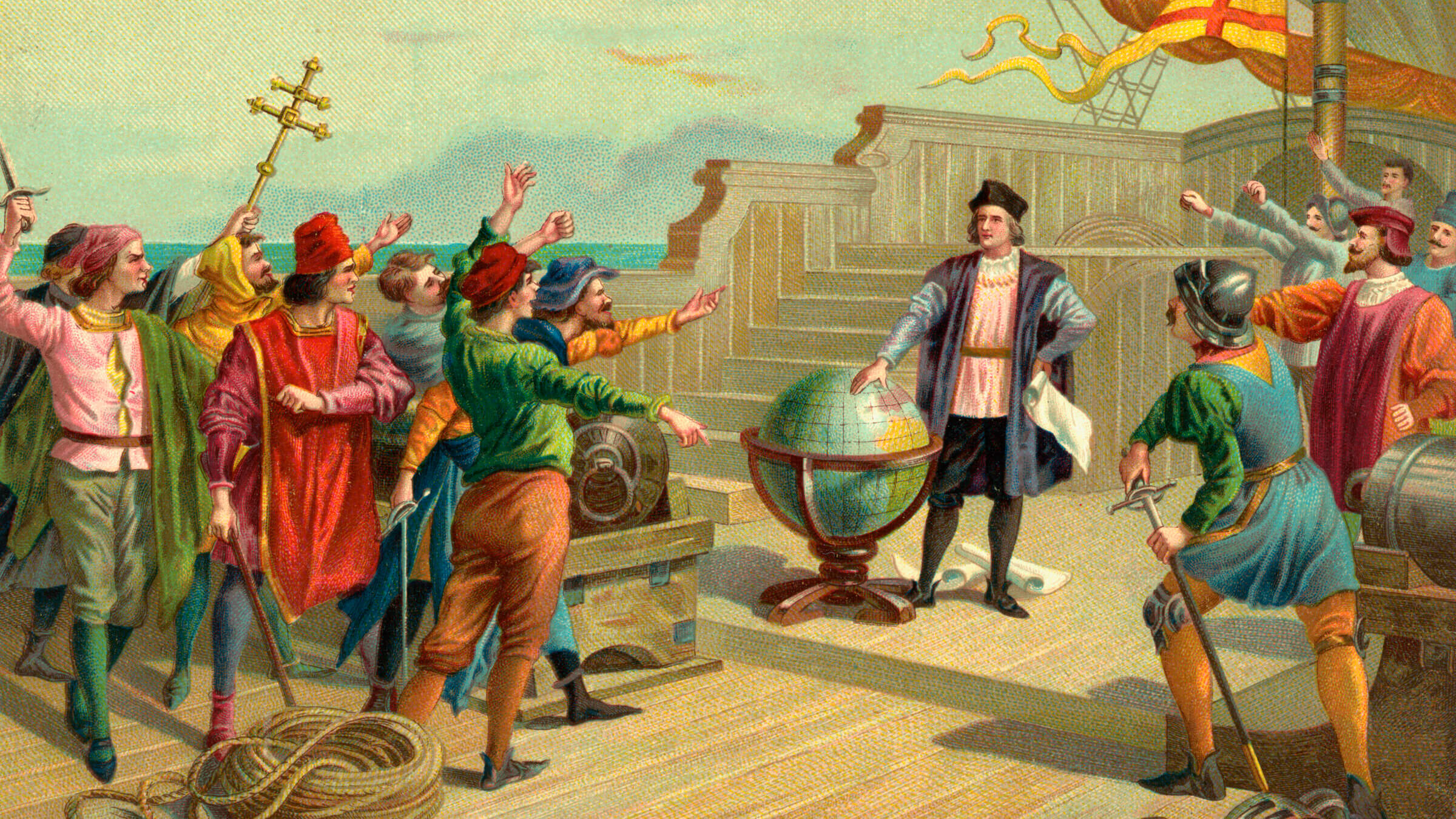Columbus may have had Jewish heritage — that doesn’t mean he was Jewish
The explorer’s writings betrayed a Christian fervor

Vintage illustration of Christopher Columbus on the deck of the Santa Maria in 1492. Photo by GraphicaArtis/Getty Images
To discover that Christopher Columbus, long whispered to have Jewish heritage, had markers of Sephardic DNA is to me about as monumental as learning the Earth is round circa 1492. In other words, it’s a belated conclusion that should effectively change little about how we understand the world today — even if some would have it otherwise.
Columbus didn’t embark to prove the Earth’s shape, as Stan Freberg insisted; people of his time knew the world was spherical. Evidence suggests Columbus was sailing in service of a devout Catholic worldview for a Catholic kingdom, which that same year expelled its Jews in an action he appears in his writings to have supported.
Still, a new Spanish documentary, which revealed that, after a 22-year investigation into Columbus and his son’s remains, researchers found “traits compatible with Jewish origin,” made international news in time for Columbus’ namesake holiday, now also known as Indigenous Peoples’ Day. The development, causing a fair amount of tsuris for Jews given Columbus’ controversial reputation, may revive an alternate theory of the explorer’s true motivations.
Legendary Nazi hunter Simon Wiesenthal’s 1973 book Sails of Hope put forward the notion that Columbus was a Spanish Marrano looking to find the lost tribes of Israel or to secure safety for his coreligionists.
“It has been percolating in our, I guess, oral traditions, literally for hundreds of years,” said Rabbi Abraham Cooper of the Simon Wiesenthal Center, who often heard Wiesenthal speak about the Alhambra Decree of 1492 in his talks around the world. Learning about the DNA evidence at the end of Yom Kippur, Cooper’s reaction was that it made “perfect sense.”
“It doesn’t mean he wasn’t looking for a path to India,” Cooper said, but, to his mind, it means that in all probability, Columbus had family victimized by the Inquisition, and the trade route may have been a pretext.
The voyage was likely a “reflection of the desperation of someone who wanted to try to find safe haven for hidden Jews and Jews were forced to flee,” Cooper said, noting that he understands how many indigenous groups may not want to celebrate Columbus Day.
Should we? Was Columbus, in fact, a Jewish hero? Experts say no. Or, at least, we can’t say with any certainty.
Laurence Begreeen, author of Columbus: The Four Voyages, said, “I don’t see in Columbus’s writings — and he did write a lot — this specific articulation of his mission.”
“For sure, he was driven by a powerful belief and that he was on a mission,” Bergreen continued, “but beyond that, I would like to tell you personally, for me, the needle hasn’t moved.”
Columbus’ awareness of his own possible Jewish roots hasn’t, to Bergreen’s mind, been demonstrated, though we do know he sailed with Jews and Conversos, likely fleeing the persecution of Columbus’ patrons, the Spanish monarchy.
As for the DNA analysis, the raw data of which has yet to be revealed, Bergreen notes its efforts were likely complicated by the fact that Columbus’ remains were buried in three separate places. (Scientists have also cast doubt on the Spanish team’s conclusions.)
This is no occasion for shepping nachas. Though historically many Italian Americans have been eager to boast the contributions of Columbus, that impulse has been complicated in recent decades, as the country reckons with Columbus’ seafaring as the beginning of a centuries-long genocide of Native Americans.
Online, many reacted to the news not in the context of the late 15th century, but the current discourse surrounding settler-colonialism and how Jews fit into the picture. Columbus’ alleged heritage has terrible implications given that lens on history.
Jews should feel conflicted at the very least, but can take some solace in knowing that there’s more to identity than a haplotype.
“Genetics doesn’t make someone Jewish,” Ronnie Perelis, the chair in Sephardic Studies at Yeshiva University, told the Jewish News Syndicate.
Indeed, Perelis said, Columbus’ writings reveal a man influenced by Jewish theology — and some even suggested he knew some Ladino — but paint a picture of someone who was, fundamentally, a Christian who believed his voyages were divinely ordained.
“It was somewhat messianic,” Bergreen said of Columbus’ mission, which included occasions where he heard the voice of God. Was it the Hebrew God? We can’t say for sure.
After centuries of speculation, perhaps what’s changed the most is that this discovery is no longer a welcome one, with comedian Alex Edelman musing, sarcastically, “this will be very good for Jews and people will be very chill about it.”























